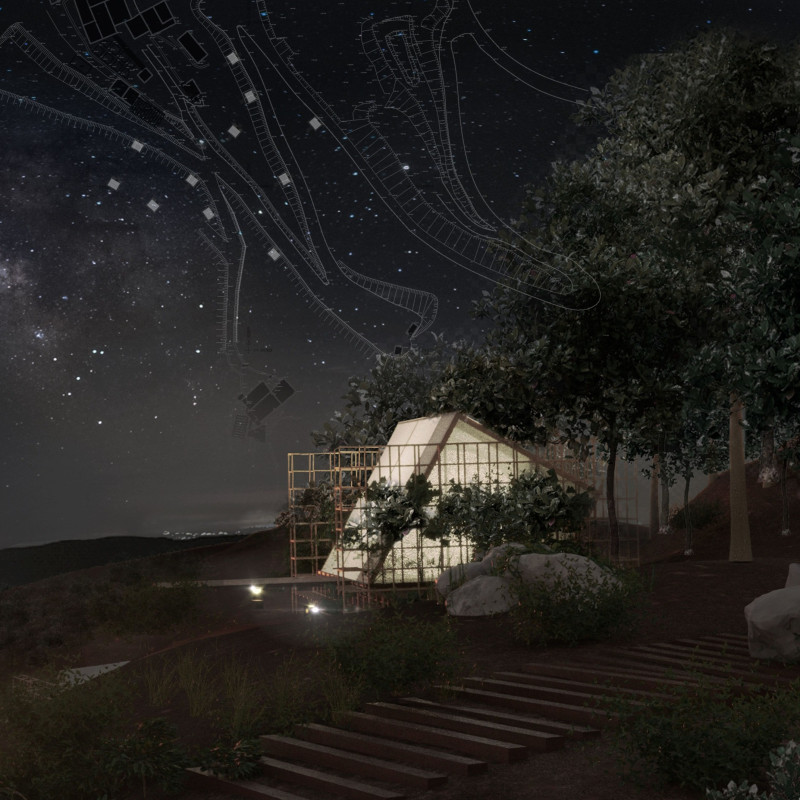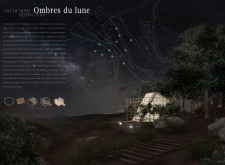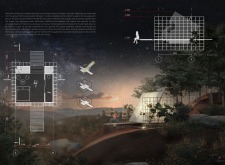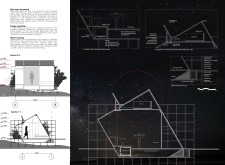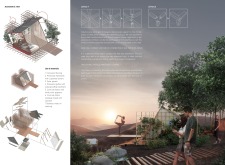5 key facts about this project
The project "Ombres du lune," located in Vale de Moses, Portugal, focuses on creating intimate sleeping pods designed to promote wellness, meditation, and a connection with nature. These architectural pods are conceived to blend seamlessly into their forested environment, utilizing sustainable materials and innovative design principles. Each pod provides a unique space for relaxation and contemplation, aimed at visitors seeking tranquility within the natural landscape.
Sustainability is at the core of this project, with a strong emphasis on local materials and ecological responsibility. The use of cork, sourced from local cork oak, serves both aesthetic and functional purposes, providing insulation while minimizing environmental impact. The modular wooden structure is framed using locally harvested pine, showcasing regional craftsmanship and ensuring the buildings are well-integrated into the hillside.
The architectural design facilitates an open interaction with the surrounding landscape through large windows and outdoor terraces. This not only provides scenic views but also invites natural light into the interior space, fostering a serene atmosphere suitable for rest and rejuvenation. The integration of solar panels on the rooftops ensures energy self-sufficiency, reducing reliance on conventional power sources.
Unique Design Innovations
One of the key distinguishing features of the "Ombres du lune" project is its elevation above ground level. This strategic design minimizes terrain disruption, allowing for effective rainwater management and reducing erosion risks on sloped sites. The raised structure also contributes to a sense of privacy while maximizing views of the natural surroundings.
Additionally, the pods utilize innovative jointing techniques inspired by traditional Japanese joinery. This method enhances stability and durability while providing a refined aesthetic. The interactive facades are engineered to support climbing plants, which evolve over time and further blend the structures with nature. The incorporation of bamboo mesh into the design facilitates natural ventilation while enhancing the overall visual appeal.
Architectural Details and Functionality
The internal layout of the sleeping pods is functional yet inviting, designed to accommodate short-term visitors while providing essential comforts. Each pod features a compact sleeping area, storage solutions, and natural materials that evoke calmness. The design promotes connectivity with nature, allowing surrounding elements such as trees and wildlife to become part of the indoor experience.
The multi-functional aspect of "Ombres du lune" is also noteworthy. The design allows for adaptability, catering to various activities including yoga sessions, mindfulness practices, or solitary retreats. This flexibility supports the primary goal of fostering wellness and relaxation among its users.
Explore the architectural plans and sections of "Ombres du lune" to gain further insight into the intricacies of this project. Delve into the architectural designs and ideas that substantiate its commitment to sustainability, functionality, and a profound connection with the environment. The project embodies principles of thoughtful architecture aimed at enhancing well-being while respecting the natural landscape.


